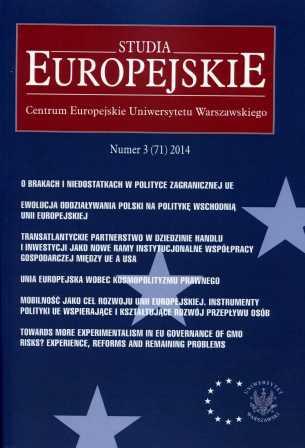Unia Europejska wobec kosmopolityzmu prawnego
The European Union’s Relationship to Legal Cosmopolitanism
Author(s): Waldemar HoffSubject(s): Law, Constitution, Jurisprudence
Published by: Centrum Europejskie Uniwersytetu Warszawskiego
Keywords: European Union; Law
Summary/Abstract: This article seeks to identify the characteristic features of legal cosmopolitanism, the EU’s attitude towards it, and its consequences. Cosmopolitanism manifests itself in creating normative systems outside and above traditional international law. While the later draws its binding power from the will of states, cosmopolitan rules are created by private actors and their binding power results predominantly from the practical necessity to obey. Such is the status of lex sportiva, of the power of rating agencies, or private accreditation bodies. Rating agencies create soft, although powerful rules concerning the standing of commercial papers, goods, services and entire national economies. Institutional examples of cosmopolitan rule are also global judicial and administrative networks. Judges and regulators exchange opinions and information, thus informally shaping the axiological foundations of decision-making. The relation of the EU towards cosmopolitan law is multifaceted. The EU has been an inspiration to the cosmopolitan legal theory and activism. In some areas the EU clearly asserts the superiority of its law, particularly where the rules of the internal market are being violated. In some instances the EU allows cosmopolitan rules to take over as is the case of the rules of the game in sports law, while in other areas the rules of both systems overlap or disjoint. Usually, the spread of cosmopolitan normative systems is the product of a power vacuum created by insuffi cient activity of the EU or national legislative bodies. The downside of legal cosmopolitanism is the danger of judicial overstepping their powers by making laws instead of applying it. Cosmopolitan organizations, including rating agencies, avoid responsibility hiding behind their status as private organizations while at the same time exercising exorbitant infl uence on public life. The most important reservation is this: by enhancing the cosmopolitan multicentricity of law and its desystemization we deprive law of its defi ning attribute – predictability. Fortunately the EU has taken some legislative actions to counterbalance the negative impact of cosmopolitanism. The recent UE regulations aimed at subjecting rating agencies to more control are a step in the right direction, and a model approach to cosmopolitan normative systems.
Journal: Studia Europejskie
- Issue Year: 18/2014
- Issue No: 3 (71)
- Page Range: 73-92
- Page Count: 19

